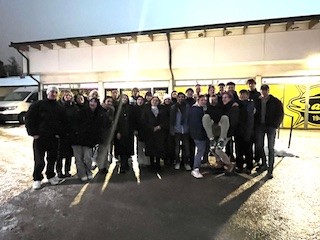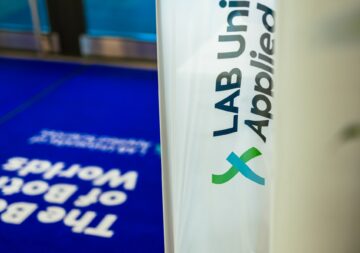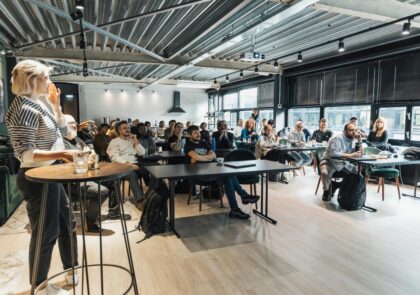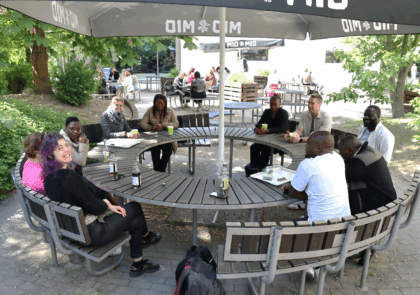
A Blended Intensive Programme called Global Citizenship and Diversity Training was launched as a side product of the GLOBDIVES-project that ended in 2023 to share key aspects of the course developed for a broader audience. Students representing 13 nationalities were challenged by solving the world’s problem of hunger and food waste and came out with some creative ideas.
Author: Jaana Häkli
Engineering students and colleagues from Avans, LAB’s strategic co-operation partner from the Netherlands joined a group of business students and a project expert from htw Saar in Germany and a multicultural and multidisciplinary group of LAB students to learn about global citizenship education and its core topics such as sustainable development goals and about how to manage diversity. These kinds of BIPs are one form of the strategic co-operation that will only be enhanced in the future.
Students’ understanding of sustainable development goals varied a great deal. During the BIP’s virtual section SDGs were broadly studied as students were given a pre-assignment to be completed in national teams. In it students had to choose a SDG of their interest and two countries from two different continents to find out how the country has achieved the SDG’s goals and what kinds of actions are being undertaken to react the goals one day. Special focus on developing countries was taken to broaden students’ understanding of them and to develop their global mindset connected to global citizenship. “I thought that SDGs were just something for the hippies and I wasn’t aware how important they are for studies or e.g. for companies”, said an industrial engineering student Amine Ait Moulay Ahmed from the Netherlands.
SDG 2: From undernourishment to avoiding food waste
During the physical mobility in January the BIP focused on SDG goal 2, Zero Hunger, to bring awareness to global challenges such as undernourishment, poor nutrition, food security and food waste. Ugly facts of this world are that 925 million people all over the world go to bed hungry every night, 90 million children face growth problems due to malnutrition and that 25,000 people die of hunger every day. Then again one third of all food produced ends in food waste (The World Food Programme). If food waste was a country, it would be the 3rd largest greenhouse gas emitter, after the United States and China (Food and Agriculture Organization of the United Nations). Behavior patterns related to food waste need to change – even if it might happen one person at a time through awareness and these kinds of examples of transformative learning that the BIPs are!
Cultural differences related to food waste
There are many cultural differences related to how a person relates to food waste. E.g. in Chinese culture you express the feeling of fullness and that your host has provided you with enough food by leaving some food on the plate. However, leaving rice on the plate is considered as a cultural taboo because it is a fundamental source of nourishment for Chinese people, instead e.g. some meat or vegetables are left on the plate. In the Netherlands people often do not even eat a warm lunch but have only sandwiches, whereas German students are not allowed to take food on their plate by themselves, but the portion is served to them. Sometimes the portion is far too big, and a lot is wasted. Hence, it was an astonishing moment for many international students to learn that 8 % of Finnish people died of hunger in 1866-1868 (Wikipedia). Even today Finnish people practice the tradition of finishing off their plates and everyone is taught from early age on to take only as much food on the plate as one can eat because it is not a sign of a sophisticated person to waste food. According to Hänninen (2024), there is really no excuse for food waste. It leaves the most vulnerable citizens exposed. It is detrimental to the environment, and it has huge economic costs.
Cultural diversity in a team produces more innovations
The BIP partnered with Lappeenranta-based Biovaaka, a technical solution to reduce food waste produced by customers in buffet restaurants and by meal production professionals in restaurant kitchens. Simple feedback for a customer in the form of a smiley face when less than 50 grams of food waste has been produced is universal. Then again receiving a sad face if the customer has produced more than 50 grams of food waste causes the shame effect that leads to awareness, learning and a welcome, transformative change in behavior. In multicultural teams students created marketing opportunities for Biovaaka to launch its product to Central-European markets as the company wants to grow. In addition, students used their knowledge about the SDG and systems thinking to innovate a new product idea targeted to SDG 2. Biovaaka got some fresh ideas for its marketing and product development and great ideas were developed to wipe the hunger problem. Many teams utilized the cultural diversity of their team members successfully. The idea to take the Dutch innovation of hydroponic cultivation to grow grass to cattle but also wheat to Mongolian people to avoid famish during cold winter months in one of the sunniest countries in the world was awarded as the best new idea. A thorough research, proper argumentation regarding students’ decision-making as well as utilizing the in-depth cultural knowledge of Mongolia due to one team member’s nationality were the keys to their success.
Finland – a true winter wonderland
The academic program of the BIP was enriched by experiencing Finnish culture in many ways from nature to sports and local culinary delights. All participants tried snowshoe walking on a guided tour and got to experience the speed and the aggressiveness of an ice-hockey game that most students saw for the first time ever. Cold temperatures of -15 or more were something new, but luckily participants were well-prepared for experiencing Finnish winter. In the spirit of sustainability instead of leaving a high carbon footprint from the BIP, students left a strong karaoke footprint in Lappeenranta and all were enriched by wonderful cultural encounters with new friends.
References
Food and Agriculture Organization of the United Nations. Cited 24.1.2024. Available at https://www.fao.org/home/en.
Hänninen, J. 2024. Biovaaka company presentation held at LAB University of Applied Sciences on 16.1.2024.
Wikipedia. Suuret nälkävuodet. Cited on 24.1.2024. Available at https://fi.wikipedia.org/wiki/Suuret_n%C3%A4lk%C3%A4vuodet
The World Food Programme. Cited 24.1.2024. Available at https://www.wfp.org/
Author
Jaana Häkli is a Senior Lecturer at LAB University of Applied Sciences, and she worked as a project manager for the GLOBDIVES project.
Illustration: BIP participants enjoy Finnish winter to the fullest on a snowshoe walking tour. (Photo: Julia Frisch)
Published 5.2.2024
Reference to this article
Häkli, J. 2024. Are SDGs just for the hippies? LAB Pro. Cited and the date of citation. Available at https://www.labopen.fi/lab-pro/are-sdgs-just-for-the-hippies/






